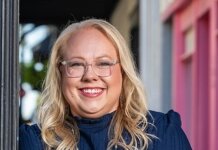For 34 years, Joe Riley was a member of the U.S. Army Special Forces Group. He traveled the world, from Panama to Portugal, coordinating major operations involving hundreds of military personnel. The missions ranged from training foreign soldiers to building schools to running medical centers.
It was a frenetic job, filled with logistical obstacles, cultural and language barriers, and countless coordination issues. Riley described it as “running around with your hair on fire all the time and changing clothes in an airport.” Yet along the way, Riley says he also learned some valuable lessons that prepared him for his current role as the manager of Federal Employees Credit Union in Birmingham.
Now, there might not seem to be many similarities between overseeing worldwide military missions and being the head of a credit union that has only four employees (three full-time and one part-time). But Riley insists that the decades he spent with Special Forces helped him make the transition into the significantly more subdued world of credit unions.
“My previous career absolutely prepared me for taking on this position, ” Riley says. “When I worked for the military, I had to do all the planning and execution for these missions in foreign countries. So I was going in, meeting with the foreign government officials, working with people and trying to help solve their problems. And really, I’m doing the same thing here, just on a different scale.”
A Birmingham native, Riley enlisted in the military in 1967 and was accepted into the Special Forces, where he remained until his retirement in May 2001. Riley gradually rose to the rank of Command Sergeant Major, one of only seven such positions in the world for the Special Forces Group. “I never thought in my wildest dreams that I would ever get that high, ” Riley says. “That was way beyond my expectations.”
Riley says he spent time in more than 15 countries, primarily in Europe and Central America. He says the goal of most of the missions was to bring some sort of aid or support to the country, such as the time Special Forces helped established a dental facility in Honduras. “People rode in on their burros from all over the country, ” Riley recalls. “They’d be lined up outside the facility. The dentist pulled more than 4, 000 teeth in about three weeks.
“We did all kinds of things like that. We went anywhere we had troops deployed. We would go to Fort Bragg (N.C.) and brief the commanding general on what missions we had planned for the upcoming year. We’d have preliminary meetings with the representatives of those countries, and then we’d have to get the air travel lined up and fly people wherever they needed to go. It was my job to coordinate and orchestrate all the logistical and operational procedures that were associated with that.”
Following his retirement from the military, Riley spent a few years in the service department at Southland International Trucks, then worked briefly for Jim Skinner Ford. But after dealing with a minor health issue in 2006, Riley decided he was simply going to enjoy retirement. It wasn’t long, however, before he received a call from Delores Neal, who was the manager at Federal Employees Credit Union, where Riley had been a member since 1975. Neal asked Riley if he was interested in working three days a week as a teller, and he agreed.

|
“That’s all I wanted to do, ” Riley says. “I did that for three years, and then Delores retired and recommended to the board that I replace her. I told her I didn’t know anything about what she did, but she said I could handle it. I met with the board, and then shadowed Delores for three months before taking over as manager in July 2010.”
Riley says one of his primary goals was to increase FECU’s asset size by at least $1 million each year. He says the credit union had $9.6 million when he took over, and that number has increased to $14.2 million as of February and is on pace to reach $15 million by the end of the year. “We’ve increased our CD rates and lowered our loan rates. That has created more volume for us, and more assets, ” Riley says. “People are bringing money in by the wheelbarrow full.”
Riley is quick to give much of the credit for FECU’s increased asset size to the work done by his employees. But Carolyn Simmons, the CEO of Social Security Credit Union in Birmingham, says it is Riley who has set the overall tone for the company.
“He seems to be dedicated to his credit union and the credit union movement, ” Simmons says. “I went to his office and met all his employees, and they seem to love him. You can really see the communication there, which is so very important. As the members walked in, the communication between the staff and the members was awesome.”
Linda Walker, the CEO of Riverdale Credit Union in Selma, also praised the work Riley has done at FECU in such a short time. In one of her first meetings with Riley, she says, it quickly became evident the passion he has for his new job, especially when it comes to helping FECU’s approximately 1, 500 members.
“We were talking about how the economy had really threatened people and the way they normally live, ” Walker says. “He mentioned that one of his members had some trouble (with loan payments). He contacted this man and had him come in and managed to reach an agreement whereby his payments were reduced and he was able to catch up. Joe worked with him to make it not be such a struggle for that member. He was able to help that gentlemen get on a better track just by coming in and discussing it, and by Joe being patient and kind to help him.”
FECU currently is open only to federal workers and their families, but Riley says he has talked with officials at the Alabama Credit Union Administration about expanding the company’s membership to include state employees.
“We have Children’s Hospital at our backdoor, ” says Riley, referring to the FECU office being located less than four blocks from the new 12-story Children’s of Alabama facility. “If we can help take care of those public servants, that would really increase our membership. We’ve recently expanded our lobby and work area to take on new members.
“We’re a nonprofit organization, and everything we do is for our members. They are our stockholders. But we don’t pay them in dividends. We pay them in the form of CDs, lower interest rates on auto and school loans, things like that. We have one asset to offer, and that’s financing.”
And in that way, Riley is trying to make Federal Employees Credit Union its own type of special force.
Cary Estes is a freelance writer for Business Alabama. He lives in Birmingham.
Text by Cary Estes • Photos by Cary Norton



